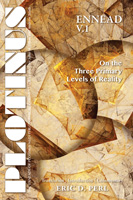
 |
PLOTINUS Ennead V.1:
On the Three Primary
Levels of Reality
Translation, with an Introduction, and Commentary
THE ENNEADS OF PLOTINUS
—WITH PHILOSOPHICAL COMMENTARIES
Series Edited by
John M. Dillon and Andrew Smith
December 2015
978–1–930972–91-9
234 pages • 5 x 7.5 • Paperback
$42.00
|
|
 Eric D. Perl Eric D. Perl
is Professor of Philosophy at Loyola Marymount University in Los Angeles.
He is the author of Theophany: The Neoplatonic Philosophy of Dionysius the Areopagite (SUNY Series in Ancient Greek Philosophy, 2007), and Thinking Being: Introduction to Metaphysics in the Classical Tradition (Brill Studies in Platonism, Neoplatonism, and the Platonic Tradition Series, 2014), as well as numerous articles on Plato, Plotinus, and other figures in the Platonic philosophical tradition. |
|
|
|
|
Plotinus’ Treatise V.1 comes closer than any other to providing an outline of his entire spiritual and metaphysical system, and as such it may serve to some degree as an introduction to his philosophy. It addresses in condensed form a great many topics to which Plotinus elsewhere devotes extended discussion, including the problem of the multiple self; eternity and time; the unity-in-duality of intellect and the intelligible; and the derivation of intelligible being from the One. Above all, it shows that the so-called “three hypostases”—soul, intellect, and the One—are best understood not as a sequence of three things additional to one another, but as three levels of possession of the same content, so that each lower level—soul in relation to intellect and intellect in relation to the One—is an “image” and “expression” of its superior.
Plotinus exhorts the human soul to overcome its alienation from its own true nature and its divine origin by first recognizing itself as superior to the body and the same in kind as the animating principle of the entire cosmos, and then discovering within itself the still higher levels of reality from which it derives: intellect and, ultimately, the One or Good, the supreme first principle of all things. To do so the soul must redirect its attention inward and upward to become aware of the divinity which is always within it but from which it is distracted by the clamor of the senses.
Plotinus was a Platonist, committed to expounding the doctrines put forward by Plato some seven centuries earlier. He was born and educated in Egypt, where he studied the teachings of Plato under the guidance of Ammonius Saccas. He came to Rome in 244 CE and built up a circle of followers devoted to studying Plato through Plato's own works and those of philosophers, both Platonist and non-Platonist, of the intervening centuries. From his fiftieth year Plotinus himself wrote down, in Greek, the findings of the seminars, and these writings were later edited by one of his pupils, Porphyry, and published in six groups of nine treatises entitled the Enneads (from the Greek word for nine – ennea).
|
|
 |
"Eric Perl has presented us with a fine translation of Ennead V.1, which is, chronologically speaking, the tenth treatise Plotinus wrote in the corpus” "The treatise itself can serve as a broad overview of Plotinian (and Neoplatonic) metaphysics for students in survey courses of ancient philosophy.” "Ennead V.1 ranks among the more significant
treatises in Plotinus’s corpus, as it is an overview of his thought.”
(Click here to read more) |
—Christopher Backes
The Catholic University of America |
|
 |
Synopsis: Ably translated into English and provided with an informative introduction and commentary by Eric De. Perl (Professor of Philosophy at Loyola Marymount University - Los Angeles) "Plotinus Ennead V.1: On the Three Primary Levels of Reality: Translation, with an Introduction and Commentary" comes closer than any other to providing an outline of the entire spiritual and metaphysical system put forward by Plotinus (c. 204/5 - 270), and as such it may serve to some degree as an introduction to his philosophy.
(Click here to read more) |
—Paul T. Vogel
Vogel's Bookshelf |
|
| “Treatise V.1 is especially noteworthy because it provides an early [10] well-organized overview of Plotinus’ system as a whole. Perl’s introduction is astute and helpful; the translation is judicious in formulation and responsive to a number of critical concerns; and the commentary is packed full of historical references and analytical details helpful to any serious reader. As a scholarly production, the work never loses sight of the central philosophical and spiritual aspirations of Plotinus. Perl meets the high standards of scholarship set by others in this series on the Enneads.” |
—Donald Blakeley
Emeritus Professor of Philosophy
California State University, Fresno
Adjunct Lecturer, Department of Philosophy
University of Hawaii, Manoa |
|
“Perl’s translation and commentary on Ennead V.1 is written with both clarity and insight. This early treatise . . . serves as a solid introduction to Plotinus, but Perl’s discerning commentary also gives the specialist much to think about.” |
—Kieran McGroarty, Senior Lecturer
Department of Ancient Classics, Maynooth Universityl |
|
“Perl masterfully takes us through one of the most significant Plotinian treatises, wherein Plotinus relates the three chief existences in his philosophy (the Soul, Intellect, and the One), and gives us advice on the way in which our soul should make the ascent to the One. The introduction and synopsis are incredibly helpful for both the expert and neophyte; the translation is lucid and readable; and his commentary adeptly references Platonic dialogues for those who wish to compare these philosophers’ views, while also covering essential details of the Greek for non-Greek readers. Perl’s excellent work will only add to this series’ already venerable reputation.” |
—David J. Yount, Professor of Philosophy
Mesa Community College, and
author of Plotinus the Platonist |
|
| “An elegant and precise translation of what is perhaps the best of all introductions to the Plotinian corpus, accompanied by a commentary arguing persuasively that, for Plotinus, ‘metaphysics is spirituality, and spirituality metaphysics.’” |
—Jean-Marc Narbonne, Professor and Canada Research Chair on the Critical Heritage
of Antiquity and its Modern Reception
Université Laval |
|
|
|
|
|
|

